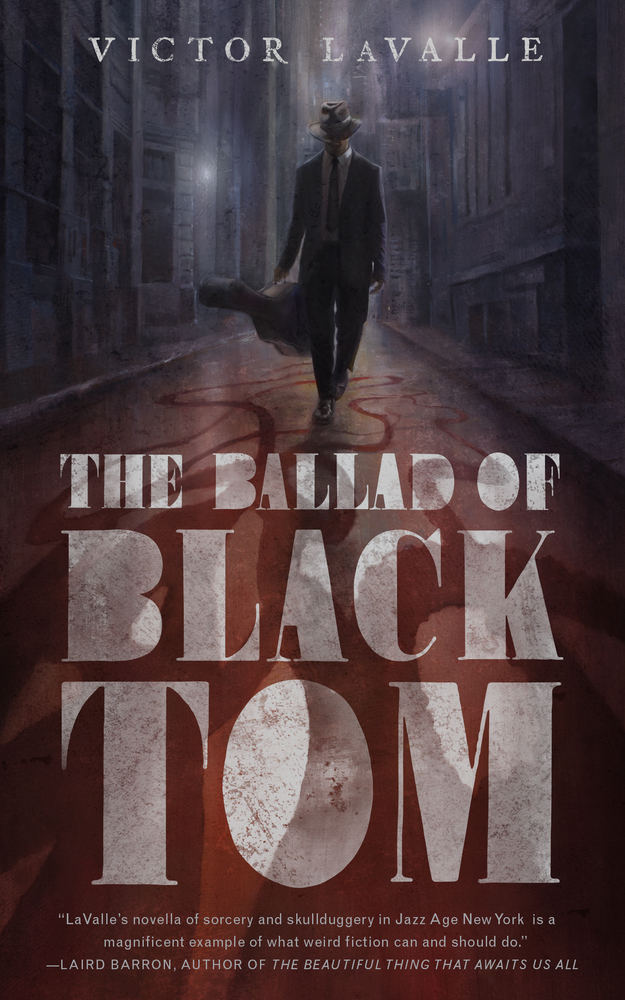
Charles Thomas Tester has everything he needs to be a successful jazz musician in 1920s New York. He is a young, black man from Harlem with a shabby suit and a guitar case. That he has no singing talent is a minor setback, since he’s willing to leave Harlem and travel to districts of New York where residents don’t know good jazz – white neighbourhoods where just interacting with a black jazz musician is an exciting, illicit experience. He has a slight awareness of the occult and quickly comes into contact with supernatural forces and sorcerers, for whom he retrieves mystical items from black and immigrant neighbourhoods and delivers them to middle-class buyers.
Victor LaValle’s The Ballad of Black Tom is a fantasy horror novel, though it has a complex and extremely unique premise. LaValle’s book hinges upon its charming protagonist, Tommy Tester, and his beautifully realised world. LaValle expertly communicates both Tester’s experience of the neighbourhood, where just walking the streets after dark is dangerous, and the reactions of white residents who feel genuinely unsafe due to the presence of a black man.
The strength of The Ballad of Black Tom is in its productive union of these details of Tester’s life with supernatural elements which gradually become more overt as the novel continues. LaValle effectively builds tension around the horror and supernatural element of his story by assigning it initially to a background role. Magic is something characters merely allude to for most of the novel while the real, dark forces are kept in the realm of rumours and hints both in dialogue and narration. LaValle clearly believes in the principle of creating suspense and allowing readers to imagine horror themselves rather than in writing scenes which are simply shocking or violent.
LaValle takes his cues in this regard from the work of early twentieth century horror writer HP Lovecraft, widely acclaimed as one of the greatest in the genre. The Ballad of Black Tom is in large part inspired by Lovecraft’s short story “The Horror at Red Hook”, and it both rewrites some of the same events and changes its emphasis. Much as LaValle clearly admires Lovecraft’s stories, though, The Ballad of Black Tom represents a challenge as much as a homage. His novel tackles the most unsavoury aspect of Lovecraft’s character and writing, namely his racism toward non-white people in general and black people in particular. His retrograde views were reasonably common for a white American of his (admittedly variable) economic circumstances in the early twentieth century, but unusually they consistently manifest themselves directly in fiction written across his career. Where black characters appear at all it is as sinister thugs or cultists, and on these occasions Lovecraft rarely fails to remark on their ignorance or innate violence.
The Ballad of Black Tom contains numerous references to Lovecraft, both to creatures he created and his views on race, though it’s written thoughtfully enough to stand completely alone. The novel fits into a growing genre of fiction which subverts classical works while acknowledging their importance, likely beginning with Wide Sargasso Sea in 1966, which told the story of Jane Eyre from the perspective of the creole character Bertha. LaValle’s novel differs in that it works from a short story, “The Horror at Red Hook”, and also in that it’s definitely better than the story on which it is based. By beautifully reworking a story which is generally considered one of Lovecraft’s worst, LaValle has bizarrely succeeded in making the original more interesting.
The close relationship between Lovecraft’s short stories and The Ballad of Black Tom is felt in one disappointing way, though. Namely, LaValle’s book worsens towards the end and finishes with an unsatisfying conclusion. Throughout his career, Lovecraft struggled to provide satisfying endings for his short stories, due as much to his focus on antagonists which were essentially incomprehensible and thus impossible to confront, as any individual short story’s issues with plot. The Ballad of Black Tom inherits some of the same difficulties and the solution, unfortunately, marginalises the personal story of Tester which provided so intriguing a premise. Nevertheless, The Ballad of Black Tom is easy to recommend. The novel is a terrific blend of horror, which is creepy throughout, with the ordinary aspects of Tester’s life. His dialogue in particular is superbly glib and cynical, and in general LaValle has a masterful command of language which can be provocative, heartfelt and most importantly scary, all within the same scene.






